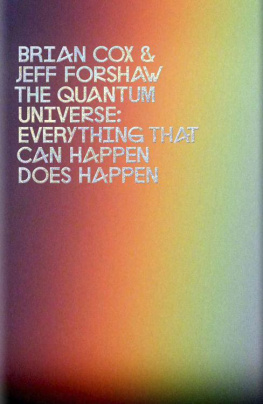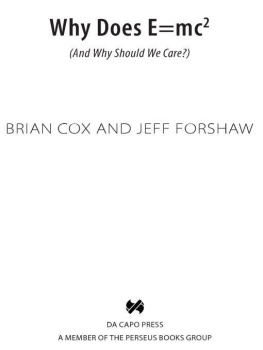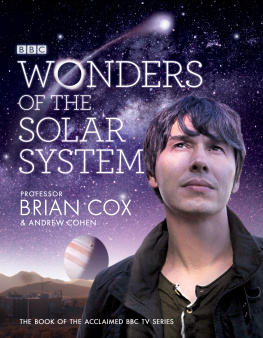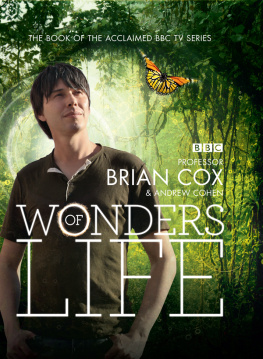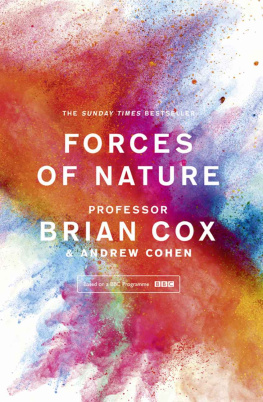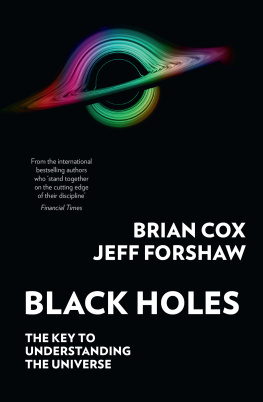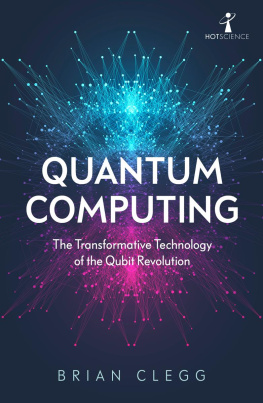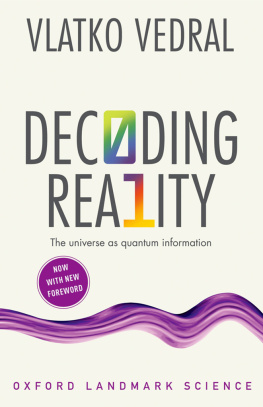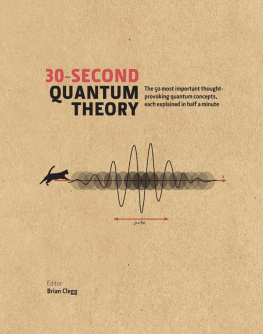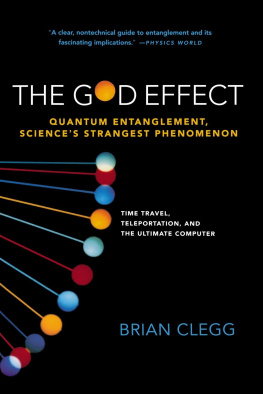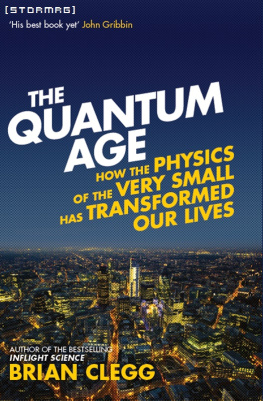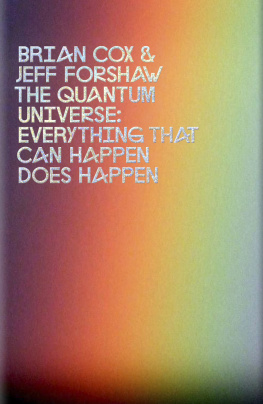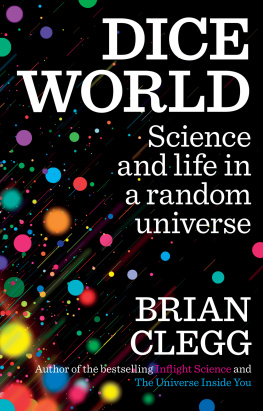Brian Cox - The Quantum Universe: Everything that Can Happen Does Happen
Here you can read online Brian Cox - The Quantum Universe: Everything that Can Happen Does Happen full text of the book (entire story) in english for free. Download pdf and epub, get meaning, cover and reviews about this ebook. year: 2011, publisher: Penguin Books Ltd, genre: Children. Description of the work, (preface) as well as reviews are available. Best literature library LitArk.com created for fans of good reading and offers a wide selection of genres:
Romance novel
Science fiction
Adventure
Detective
Science
History
Home and family
Prose
Art
Politics
Computer
Non-fiction
Religion
Business
Children
Humor
Choose a favorite category and find really read worthwhile books. Enjoy immersion in the world of imagination, feel the emotions of the characters or learn something new for yourself, make an fascinating discovery.
- Book:The Quantum Universe: Everything that Can Happen Does Happen
- Author:
- Publisher:Penguin Books Ltd
- Genre:
- Year:2011
- Rating:4 / 5
- Favourites:Add to favourites
- Your mark:
- 80
- 1
- 2
- 3
- 4
- 5
The Quantum Universe: Everything that Can Happen Does Happen: summary, description and annotation
We offer to read an annotation, description, summary or preface (depends on what the author of the book "The Quantum Universe: Everything that Can Happen Does Happen" wrote himself). If you haven't found the necessary information about the book — write in the comments, we will try to find it.
The Quantum Universe: Everything that Can Happen Does Happen — read online for free the complete book (whole text) full work
Below is the text of the book, divided by pages. System saving the place of the last page read, allows you to conveniently read the book "The Quantum Universe: Everything that Can Happen Does Happen" online for free, without having to search again every time where you left off. Put a bookmark, and you can go to the page where you finished reading at any time.
Font size:
Interval:
Bookmark:

B
Everything that can happen does happen

ALLEN LANE
an imprint of
PENGUIN BOOKS
B
B
Wed like to thank the many colleagues and friends who helped us get things right and provided a great deal of valuable input and advice. Particular thanks go to Mike Birse, Gordon Connell, Mrinal Dasgupta, David Deutsch, Nick Evans, Scott Kay, Fred Loebinger, Dave McNamara, Peter Millington, Peter Mitchell, Douglas Ross, Mike Seymou2 r, Frank Swallow and Niels Walet.
We owe a great debt of gratitude to our families to Naomi and Isabel, and to Gia, Mo and George for their support and encouragement, and for coping so well in the face of our preoccupations.
Finally, we thank our publisher and agents (Sue Rider and Diane Banks) for their patience, encouragement and very capable support. A special thanks is due to our editor, Will Goodlad.
B
Quantum. The word is at once evocative, bewildering and fascinating. Depending on your point of view, it is either a testament to the profound success of science or a symbol of the limited scope of human intuition as we struggle with the inescapable strangeness of the subatomic domain. To a physicist, quantum mechanics is one of the three great pillars supporting our understanding of the natural world, the others being Einsteins theories of Special and General Relativity. Einsteins theories deal with the nature of space and time and the force of gravity. Quantum mechanics deals with everything else, and one can argue that it doesnt matter a jot whether it is evocative, bewildering or fascinating; its simply a physical theory that describes the way things behave. Measured by this pragmatic yardstick, it is quite dazzling in its precision and explanatory power. There is a test of quantum electrodynamics, the oldest and most well understood of the modern quantum theories, which involves measuring the way an electron behaves in the vicinity of a magnet. Theoretical physicists worked hard for years using pens, paper and computers to predict what the experiments should find. Experimenters built and operated delicate experiments to tease out the finer details of Nature. Both camps independently returned precision results, comparable in their accuracy to measuring the distance between Manchester and New York to within a few centimetres. Remarkably, the number returned by the experimenters agreed exquisitely with that computed by the theorists; measurement and calculation were in perfect agreement.
This is impressive, but it is also esoteric, and if mapping the miniature were the only concern of quantum theory, you might be forgiven for wondering what all the fuss is about. Science, of course, has no brief to be useful, but many of the technological and social changes that have revolutionized our lives have arisen out of fundamental research carried out by modern-day explorers whose only motivation is to better understand the world around them. These curiosity-led voyages of discovery across all scientific disciplines have delivered increased life expectancy, intercontinental air travel, modern telecommunications, freedom from the drudgery of subsistence farming and a sweeping, inspiring and humbling vision of our place within an infinite sea of stars. But these are all in a sense spin-offs. We explore because we are curious, not because we wish to develop grand views of reality or better widgets.
Quantum theory is perhaps the prime example of the infinitely esoteric becoming the profoundly useful. Esoteric, because it describes a world in which a particle really can be in several places at once and moves from one place to another by exploring the entire Universe simultaneously. Useful, because understanding the behaviour of the smallest building blocks of the Universe underpins our understanding of everything else. This claim borders on the hubristic, because the world is filled with diverse and complex phenomena. Notwithstanding this complexity, we have discovered that everything is constructed out of a handful of tiny particles that move around according to thepin rules of quantum theory. The rules are so simple that they can be summarized on the back of an envelope. And the fact that we do not need a whole library of books to explain the essential nature of things is one of the greatest mysteries of all.
It appears that the more we understand about the elemental nature of the world, the simpler it looks. We will, in due course, explain what these basic rules are and how the tiny building blocks conspire to form the world. But, lest we get too dazzled by the underlying simplicity of the Universe, a word of caution is in order: although the basic rules of the game are simple, their consequences are not necessarily easy to calculate. Our everyday experience of the world is dominated by the relationships between vast collections of many trillions of atoms, and to try to derive the behaviour of plants and people from first principles would be folly. Admitting this does not diminish the point all phenomena really are underpinned by the quantum physics of tiny particles.
Consider the world around you. You are holding a book made of paper, the crushed pulp Trees are machines able to take a supply of atoms and molecules, break them down and rearrange them into cooperating colonies composed of many trillions of individual parts. They do this using a molecule known as chlorophyll, composed of over a hundred carbon, hydrogen and oxygen atoms twisted into an intricate shape with a few magnesium and nitrogen atoms bolted on. This assembly of particles is able to capture the light that has travelled the 93 million miles from our star, a nuclear furnace the volume of a million earths, and transfer that energy into the heart of cells, where it is used to build molecules from carbon dioxide and water, giving out life-enriching oxygen as it does so. Its these molecular chains that form the superstructure of trees and all living things, and the paper in your book. You can read the book and understand the words because you have eyes that can convert the scattered light from the pages into electrical impulses that are interpreted by your brain, the most complex structure we know of in the Universe. We have discovered that all these things are nothing more than assemblies of atoms, and that the wide variety of atoms are constructed using only three particles: electrons, protons and neutrons. We have also discovered that the protons and neutrons are themselves made up of smaller entities called quarks, and that is where things stop, as far as we can tell today. Underpinning all of this is quantum theory.
The picture of the Universe we inhabit, as revealed by modern physics, is therefore one of underlying simplicity; elegant phenomena dance away out of sight and the diversity of the macroscopic world emerges. This is perhaps the crowning achievement of modern science; the reduction of the tremendous complexity in the world, human beings included, to a description of the behaviour of just a handful of tiny subatomic particles and the four forces that act between them. The best descriptions we have of three of the forces, the strong and weak nuclear forces that operate deep within the atomic nucleus and the electromagnetic force that glues atoms and molecules together, are provided by quantum theory. Only gravity, the weakest but perhaps most familiar of the four, does not at present have a satisfactory quantum description.
Next pageFont size:
Interval:
Bookmark:
Similar books «The Quantum Universe: Everything that Can Happen Does Happen»
Look at similar books to The Quantum Universe: Everything that Can Happen Does Happen. We have selected literature similar in name and meaning in the hope of providing readers with more options to find new, interesting, not yet read works.
Discussion, reviews of the book The Quantum Universe: Everything that Can Happen Does Happen and just readers' own opinions. Leave your comments, write what you think about the work, its meaning or the main characters. Specify what exactly you liked and what you didn't like, and why you think so.

